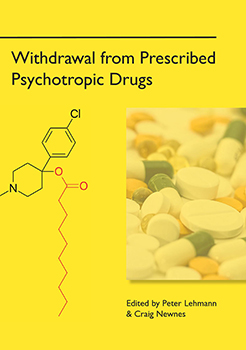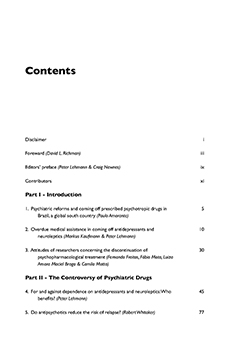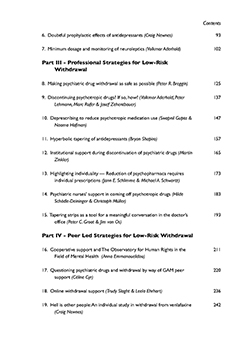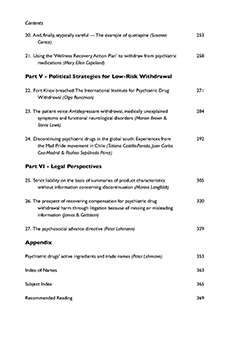Withdrawal from Prescribed Psychotropic drugs
Edited by Peter Lehmann and Craig Newnes
* PURCHASE THE BOOK FROM BOOKVAULT *
Published on May 12th, 2023
396 pages / Language - English
ISBN 13: 978-1-8380636-1-0
If you are purchasing for an organisation please email us first at badonner@gmail.com
Synopsis
Doctors, including psychiatrists, prescribe antidepressants, neuroleptics (“antipsychotics”), mood stabilizers, tranquillizers and psychostimulants all over the world, and, in most cases, without providing information about the risks of taking them and problems when stopping, for example, adverse effects, tolerance formation, bodily and psychological dependence and withdrawal symptoms. Nor do they tell people about ways to avoid or minimize the risks. In its report to the General Assembly of the United Nations, even the Human Rights Council’s Working Group on Arbitrary Detention demand assistance in withdrawing from prescribed psychotropic drugs for those who want to withdraw.
This volume presents a collaboration of users and survivors of psychiatry (ex-patients), professionals, researchers, lawyers, and academics around the world committed to helping people understand the potential harm (including drug dependence) that prescribed psychotropic drugs can cause and how to safely reduce or stop taking them. The chapters include individual accounts of people who discontinued their prescribed psychotropic drugs, information about withdrawal groups, research data (especially about antidepressants and neuroleptics) and a commitment to relatively safe withdrawal that will offer hope to many people; those who want to help and those who want to withdraw.
Editors
Peter Lehmann: Peter is an author, social scientist, publisher, and an independent freelance activist in humanistic anti-psychiatry, living in Berlin, Germany.
Craig Newnes: Craig is a Consulting Critical Psychologist and Compassionate Conversationalist, ex-Director of Psychological Therapies for Shropshire's Mental Health (NHS) Trust, dad, grandad, editor and author.
Please note that an eBook edition can be ordered here
Preview
Reviews
This book is a compilation of wisdom from those who have gone through the experience of coming off psychiatric drugs themselves, and those who have helped other people go through it. It is full of sensible advice and suggestions and provides invaluable guidance for patients and professionals alike.
- Joanna Moncrieff, University College London, author of The Bitterest Pills
Millions of individuals have been prescribed psychiatric drugs, but many discover that these drugs – physically and psychologically – do more harm than good, and then, seeking strategies for safe withdrawal, they discover that shockingly few doctors understand the science behind these drugs' actions. In a sane world, Withdrawal from Prescribed Psychotropic Drugs would be required reading for medical school students and prescribing physicians, but non-professionals need not wait for a saner world, as comprehending this book requires no advanced degree.
- Bruce E. Levine, author of Resisting Illegitimate Authority
Free of industry bias, this book is a clarion call for informed medical decision making for starting and stopping psychiatric medications.
- Pat Deegan
… a comprehensive overview of both the advantages and the problems associated with withdrawal, as well as potential solutions. It shows the controversial attitudes of professional researchers, highlights the perspective of (ex-) patients themselves, touches upon legal remedies, suggests changes in policies and can be recommended as a valuable information resource both to professionals and policymakers, and to the wider public.
- Olga Kalina, Chair of the European Network of (ex-) Users and Survivors of Psychiatry
You may say that it is up to the individual to decide whether to take drugs, or that you already know about the harmful effects of psychotropic drugs. However, I still recommend this book to you, assuring you of a valuable discovery - lived-experiences and self-help practices as well as medical information and methods on withdrawal problems and solutions in various regions.
- Kasumi Ito, research fellow of the Japan Society for the Promotion of Science
During the last 40 years, I have accompanied hundreds of psychiatric patients, who tried to come off psychiatric drugs. All of them had to do it by themselves, because there was no competent support available. Very few succeeded. And I have followed many who died before the age of 50 to the grave due to metabolic syndrome caused by neuroleptics. This book is much needed.
- Maths Jesperson, founder of Personal Ombudsman in Skåne
Contributing to a growing trend of supporting responsible withdrawal from psychiatric medication, this book brings together a broad range of authors and topics across continents, offering up-to-date, reliable, accessible information that would enable persons wishing to come off prescribed psychotropic drugs pursue their recovery goals. A truly remarkable contribution!
- Eugenie Georgaca, School of Psychology, Aristotle University of Thessaloniki
Once more, Peter Lehmann has edited an historic resource that revolutionizes mental health – now together with Craig Newnes. The social change movement led by people with lived experience of mental health issues champions “choice” as a central principle. Some of us reject all psychiatric drugs; others take them, voluntarily or involuntarily. In my 45 years as a psychiatric survivor activist, I’ve met many who experience brain changes from psychiatric prescriptions, making it very difficult to quit. Peter and Craig’s thorough, meticulous manual defends true freedom of choice.
- David W. Oaks, Ačiū! Institute, LLC
"There is a crack, a crack in everything. That's how the light gets in." (Leonard Cohen) This anthology shows there are cracks, there is light ahead of us when it comes to finding safe ways to withdraw from psychotropic drugs and to overcome the worldwide psychiatric epidemic: the ideas and practices of labelling human diversity as illnesses in need of lifelong "treatment" with artificial chemicals, harmful to the human body, mind and soul. My hope is that this publication will support and strengthen global efforts to liberate and safeguard our inner world from being polluted, damaged and destroyed.
- Karl Bach Jensen, former Co-chair of the World Network of Users and Survivors of Psychiatry
Psychiatry continues to torment people with ever increasing dosages of multiple potent psychotropic drugs to be taken forever. This volume provides a powerful antidote to this perpetual development by enshrining the human and ethical right of free choice to take, refuse or withdraw from psychiatric drugs.
- Peter Stastny, psychiatrist, co-editor of Alternatives Beyond Psychiatry, and co-author of The Lives They Left Behind: Suitcases from a State Hospital Attic
This excellent anthology looks at the real evidence and brings vital knowledge to where pharma's profit-driven healthcare research refuses to go. People can and do live better lives without psychiatric medication: here's why and how to withdraw.
- Will Hall, author of the Harm Reduction Guide to Coming Off Psychiatric Drugs and schizophrenia diagnosis survivor



